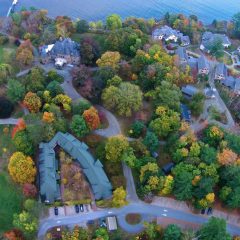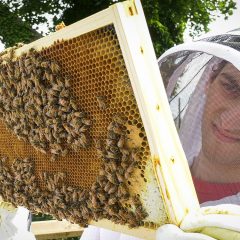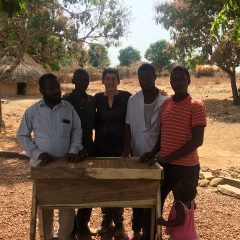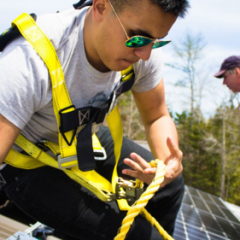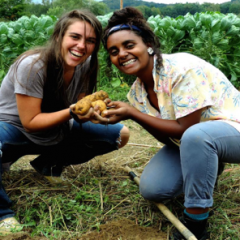Setting the Bar: EcoLeague Institutions Receive Top Ratings in Green Education
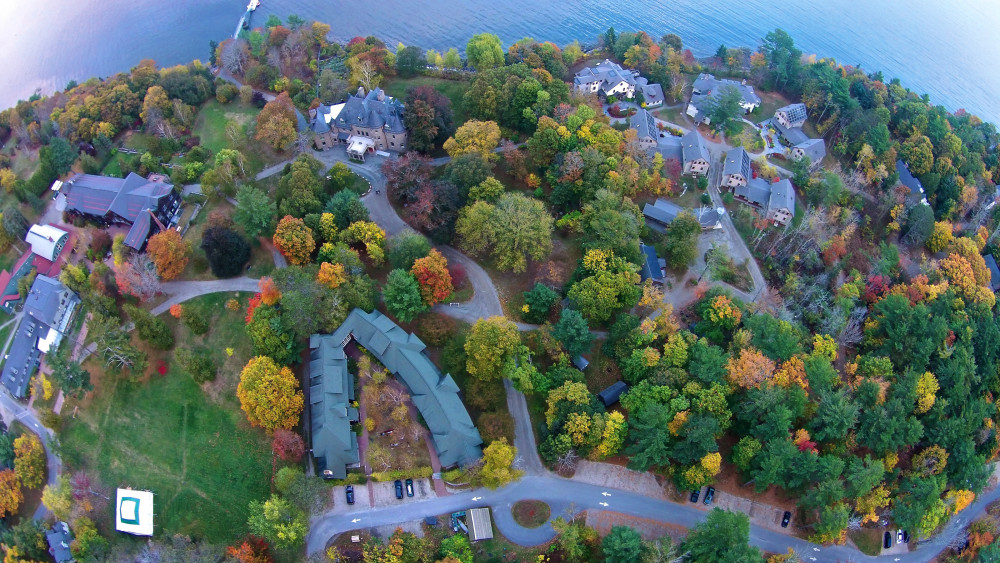
With decades of experience in environmental stewardship and sustainability studies, the EcoLeague consortium continues to be a leading innovator in green education. A host of sustainability initiatives at Northland College have placed it on Sierra Magazine’s List of Cool Schools, joining EcoLeague partners and perennial staples atop the rankings, College of the Atlantic (#1 in ’17 and ‘16) and Dickinson College (#6 in ’18, #25 in ’17).
From sustainable food practices and sustainability across curricula to eco-friendly housing, EcoLeague campuses create a holistic educational environment for students, and provide the tools to forge a sustainable future. It is no surprise then, that continued efforts of EcoLeague members to improve curricula and energy consumption were also recognized by the Association for the Advancement of Sustainability in Higher Education (full 2018 rankings here).
While Dickinson College claimed the top spot overall in sustainability for Baccalaureate institutions, Northland College came in at #8. All three aforementioned EcoLeague members were rated in the top ten for curriculum, with College of the Atlantic (CoA) was among the highest rated institutions for campus grounds.
Recent innovations in sustainability at EcoLeague institutions include:
College of the Atlantic
-Approved a comprehensive Discarded Resource and Material Management Policy, a student initiative to achieve 90% diversion of discarded materials campus-wide by 2025.
-At least 75% of COA’s faculty is engaged in sustainability research. More than 35% of the classes offered are related to the environment, sustainability, and social justice.
–Divested from fossil fuels as early as 2013.
-The first college in the U.S. to focus on the relationship between humans and the environment, where each student develops their own course of study in human ecology.
-Created the Community Energy Center to focus on renewable energy efforts in the surrounding community, including the Solar for Businesses and Farms program.
“I believe strongly that being innovative isn’t about chasing ‘the next greatest’ idea, but on focusing our innovations around what we do best and have been doing for nearly five decades—interdisciplinary, experiential education focused on addressing our planet’s most pernicious social and environmental issues,” said COA President Dr. Darron Collins ’92.
Dickinson College
-Completed a new 12,456 panel solar array to help meet Dickinson’s 2020 goal of carbon neutrality.
-New Residence Hall designed to enhance the student residential experience and meet Leadership in Energy and Environmental Design (LEED) Platinum for Homes standards.
-Launched an online Sustainability Dashboard to track energy use on campus.
-Composted 127 tons of food waste in 2017-18 and diverted 51% of their total waste.
-94% of students in the Class of ‘18 took a sustainability course without requirement. A sustainability course is now part of the requirements for a degree at Dickinson.
“Sustainability is part of the academic and co-curricular experience of every Dickinson student,” said Neil Leary, director of the Center for Sustainability Education. “It is also a guiding principle for campus strategic planning and operations.”
Northland College
-More than 80 percent of faculty incorporate sustainability into the classroom
-Composted 96,000 pounds of food waste for 2017/18 school year.
-Spent 46 percent of budget on local foods (within 100 miles of campus).
–Voted to divest from fossil fuels.
-Northland College Student Association purchased 100, 200-watt solar sharesds at Xcel Solar Garden.
-Became Wisconsin’s first Bee Campus as a way to promote pollinators.
“Faculty, staff, and students live the College’s environmental mission every day,” said Scott Grinnell, director of sustainability initiatives at Northland College. “Thinking about how our actions will advance sustainability in all forms—food, water, energy, stewardship, development, diversity, and social justice.”
GMC’s Kara Kessler ’11 Graduates from EcoLeaguer to Sustainable Entrepreneur
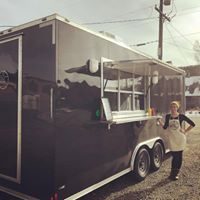
by EcoLeague Communications and Digital Media Assistant Claire Jeantheau, Dickinson ’21
Kara Kessler, a 2011 graduate of Green Mountain College, currently manages her own vegan food truck and holds a passionate interest in human relationships with the natural world. But discovering this path wouldn’t have been possible without her two-time exchanges through EcoLeague, marked by their experiential activities.
When she entered her first year at Green Mountain, Kessler was certain that she would study psychology—the high school class she found most interesting. After a “spontaneous” decision to go on an EcoLeague exchange in fall 2008 to Northland College, she learned the value of studying a broad mix of subjects.
“Green Mountain College had six hundred people at the time, so I decided that it’d be good to get out. And then I got [to Northland] and realized the importance of different areas of study, different professors,” Kessler recalled.
Kessler’s classes at Northland ranged from art and literature to adolescent psychology. However, it was a seminar on ecopsychology—a field examining relationships between humans and the natural world—that she found “the most intriguing, interesting, and defining”.
“I had a professor suggest ecopsychology,” Kessler explained, “and I had never heard of that, but it sounded very interesting. And so I studied ecopsychology… that’s when I realized I know what I want to do, I know what I want to learn more about.”
Having found her academic interest, she made the distinctive choice of completing a second EcoLeague exchange, this time at Prescott College in Fall 2010. By completing two exchanges, she was able to study ecopsychology in depth, particularly through her coursework at Prescott. Kessler credits EcoLeague with giving her the opportunity to discover a field that she wouldn’t have been able to explore at her home college.
“After my first EcoLeague experience, I realized … I can’t study [ecopsychology] at Green Mountain College, I’m going to pursue that individually, I’m going to research and tailor my degree to it.”
Because of EcoLeague’s experiential nature, many of Kessler’s favorite memories of her exchanges took place outside of the classroom. At Northland, she enjoyed studying near Wisconsin’s Lake Superior, a new environment from her home college in Colorado. There, she fondly remembers hiking in local wildlife and seeing the area’s aspens in the fall.
Later at Prescott, where she “got to take a lot of field trips,” she began her semester with a trip to Northern California to study sea psychology and marine biology for a month. The experience was made possible by Prescott’s unique schedule, which begins with an intensive three-week “Block” class before a typical pattern of semester classes.
Kessler now applies the interest in ecopsychology she cultivated in EcoLeague as the owner and operator of a vegan food truck. The Vegetable Express is based in Nederland, Colorado, and describes its goal on social media as “feeding your mind, body, and soul with plant-based foods.”
“On a different level, sustainably, I can heal the planet this way through plant-based eating, and I’m connecting to people and helping people psychologically through food. It’s been about how you relate to it, how you see it,” Kessler said, tying her EcoLeague studies to her current work. “[EcoLeague] definitely prepared me to do what I’m doing.”
If you are passing through Nederland, don’t forget to stop by Kessler’s Vegetable Express to support sustainability and, more importantly, to nurture the mind and body!
EcoLeague Alumni Profile: Travis Sherlin, Northland College ’15

Travis Sherlin graduated from Northland College in 2015, distinguishing himself by completing two EcoLeague exchanges, one at Prescott College (Spring 2014) and another at Dickinson College (Spring 2015). He currently works as an agroforester for the Peace Corps in Guinea, West Africa. We recently caught up with Travis to learn more about sustainable community development, developing his own class, and the impact EcoLeague had on his current work:
How did you get involved with EcoLeague?
As soon as I heard about EcoLeague, I knew I wanted to do it. How often do you get the chance to see more of the world without drastically changing your life plans? I was able to study exactly what I wanted, without having to navigate a precarious tuition cost switch, and see more of the beautiful US.
Why did you choose to study at Dickinson and Prescott?
I chose to study at Prescott because of a program that I had heard very high acclaim for—the social justice education block in Tucson with [Director of Prescott College Tucson] Anita Fernández. My plans were never to study education. Instead, I was interested in sustainable community development. Fortunately, I had the foresight to understand that socially just education looked very similar to socially just planning. Of all my education, that block has proven to be one of the most impactful, transformative, and enlightening. I’m very grateful for Dr. Fernández, her associates, and all their work. A huge bonus to that academically and emotionally rigorous course was the physically challenging rock climbing semester that preceded it. What luck to be able to work your academic and physical muscles in the same semester!
I chose Dickinson College, similarly, for its amazing course list and prestige. [Assistant Professor of Women’s, Gender, and Sexuality Studies] Katie Oliviero is a professor that challenged me like few others. Inside her course covering gender, migrations, and feminisms, every one of my conceptions on those three topics was challenged. Dr. Oliviero has a gentle but firm way of calling perceptions into question and pushing you to stretch your mind to own a fuller understanding of the course topics and the world around us. Her class was intimidating in the best way. I was pushed and I’m grateful for it. Too often, college students are graded on completing coursework regardless of whether learning occurred or not. Dr. Oliviero values academic growth as all professors ought to.
What kinds of academic work or research did you do while on exchange?
EcoLeague offered me the opportunity to create a class with a colleague of mine entitled “Advanced Readings in Urban Political Economy.” Through this course we were allowed to visit major cities around the northeastern US like New York City and Philadelphia, and in tandem with reading excellent scholarly works on city planning, evaluating and transcribing our perceptions and ideas of the cities we saw. This allowed us to take the years of readings and course work about city planning we had done and apply those ideas to our critiques of modern cities we visited. Brian Tochterman [Northland College Assistant Professor of Sustainable Community Development] did an excellent job of encouraging us to perceive and critique the world around us on a micro and macro scale.
What’s your favorite program memory from outside the classroom?
There were many wonderful memories that were made possible by EcoLeague. Rock climbing Moby Dick, a five pitch climb to a gorgeous vista and a 200 foot free repel at the Cochise Stronghold in Southern Arizona; real moments of incredibly difficult but life-changing epiphanies or revelations brought on by the help of fellow classmates; forging strong bonds with [Dickinson’s] local community of Carlisle by bartending at one of their finest Italian eateries, Trattoria Piatto; or working with groups that support undocumented students in the US. EcoLeague provided me with a plethora of truly incredible opportunities that I never would have had access to otherwise.

Have your EcoLeague experiences helped prepare you for your current work with the Peace Corps? How so? Any future plans?
I’m currently serving as an agroforester with the Peace Corps in Guinea, West Africa and I’m certain that Dr. Oliviero’s course gave me an educational prologue to understanding the very complex and tangled history of colonization, migrations, and milieu of places such as this. It has allowed me a very special perspective with which to view the modern history of Guinea. Likewise, a student of some excellent Community Development teachers like [Northland Associate Professor of Sustainable Community Development] Brandon Hofstedt and Brian Tochterman at Northland College, my position as a Peace Corps volunteer is not simple. I have a byzantine relationship with local development politics and have a whole new appreciation for international development work now that I’ve been working at the grassroots level for two years. I owe any success I’ve realized here to the whole of my education with emphasis on my EcoLeague experiences.
What advice do you have for students interested in EcoLeague?
Do it! It can break up monotony that sometimes accompanies academically rigorous schedules. It immediately inflates your course catalogue and options three or four-fold. Moreover, who doesn’t want to expand their geo-social perspective of the world and at the same time take incredible classes by incredible professors? It’s too good an opportunity to pass up.
Interview conducted by EcoLeague Communications and Digital Media Assistant Claire Jeantheau, Dickinson ’21
COA and GMC Top 2 Greenest Schools in the Nation

EcoLeague members College of the Atlantic (COA) in Bar Harbor, ME, and Green Mountain College (GMC) in Poultney, VT, came in at #1 and #2 in Sierra magazine’s list of environmentally focused “Cool Schools.” This marks COA’s second straight year atop Sierra’s rankings, while GMC became the only school to receive a spot in the top 15 for a remarkable 8 straight years. Divesting from fossil fuel companies and a commitment to diverting 90 percent of campus waste by 2025 have made COA a perennial leader in sustainability, where all 350 of its students study human ecology.
The college boasts two organic farms, an island research station for the study of marine mammals, and proximity to Acadia National Park, where students have unique access to experiential learning. Other innovative programs include the Hatchery—where young entrepreneurs transform ideas into sustainable business models, and an initiative to promote the use of solar power at local farms and businesses.
“We’re proud of the changes we’ve made in moving away from fossil fuels and improving the sustainability of our college, notes College of the Atlantic President Darron Collins ’92. “But what’s most important is that students are involved to the fullest extent possible. This year our students led an effort to completely overhaul how we handle waste and think about consumption on campus, and class projects have installed solar panels and improved energy efficiency. We strongly believe that involving students in projects like this is crucial for preparing them to be effective environmental leaders.”
At GMC, which received the highest rating in Sierra’s curricular category for its green programs, ecological design students build electric tractors, tiny houses, and solar photovoltaic arrays on garages. The campus also features the Cerridwen Farm, which provides food for GMC’s cafeteria, and where students gain hands-on experience and participate in community supported agriculture programs.
All GMC students contribute to a greening fund selected through campus vote, which has sponsored past
initiatives like bike-sharing, a biomass facility, and a bat habitat. On GMC’s consistently stellar rankings, college President Bob Allen remarks, “The latest honor is confirmation of what we’ve known all along—that
Green Mountain College is one of the best colleges in the United States in preparing students to meet our environmental, economic and social challenges. I’m particularly proud of the fact that GMC ranked number two in the nation.”
With numerous evolving innovations in Green education, COA and GMC figure to be mainstays at the top of Sierra’s “Cool Schools” list for years to come.
Article based on sources provided by www.greenmtn.edu, www.coa.edu, and www.sierraclub.org.
Theatre Teams Up with Dickinson College Farm in Grapes of Wrath

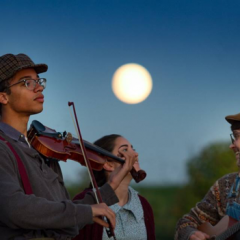
Theatre students Max Jacobs, Gaby Corcoran, and Alexander Dillon (left to right) perform at the Dickinson College Farm
Under a moonlit sky overlooking central Pennsylvania’s rolling hills at the Dickinson College Farm, Theatre Professor Karen Lordi-Kirkham dissolved traditional barriers separating audience and cast members with her immersive, outdoor adaptation of John Steinbeck’s Grapes of Wrath. Rather than watch crew members bustling between scenes to change set displays, theatre-goers meandered from scene to scene on their own journey, as the setting transformed with each of the 14 open-air stations created by Assistant Professor of Theatre Design, Kent Barrett.
The natural landscape of the farm enhanced empathy for a cast of downtrodden characters all seeking an escape from the environmental and economic disasters of the 1930s. The devastating combination of the Dust Bowl and the aftermath of the Great Depression led Steinbeck’s “Okies” (the Joad family) to pack up their belongings for the promises of greener pastures in California. Walking in the footsteps of the actors, the thin film of earth that had accumulated on the shoes of the audience members disappeared from view as the last gasps of sunlight turned to darkness, and hopes of a better life elsewhere for Steinbeck’s domestic migrants were dashed at each turn.
Originally written “to put a tag of shame on the greedy bastards who are responsible for [the Great Depression],” according to Steinbeck himself, Lordi-Kirkham also shined a light on contemporary issues of migration, climate change, and economic inequality. “The issues in our country make this play thematically relevant,” Lordi-Kirkham said. “Even in Harrisburg there’s a tent city.” Barrett reached out to area farmers and tent city residents to explain the project and request consent to include their images in his displays. We wanted to focus on “How we think about people who have been forced out of their homes and how they’re struggling in a way that is not all that different from the Joads’ journey that Steinbeck is talking about,” Lordi-Kirkham added.
While farm directors and theatre staff helped with the numerous challenges of outdoor theatre production, Dickinson’s Center for Sustainability Education and the Civic Engagement Initiative, funded by the Andrew W. Mellon Foundation, provided financial support to purchase portable, weather-resistant, and eco-friendly LED lighting, as well as assist in transportation to and from the farm. Beyond the production’s purely artistic value, Lordi-Kirkham noted the added benefit of “people realizing the farm exists and the beauty of it. One person commented that they had only seen the barn when they pick up their CSA, and never realized what lay beyond and how beautiful it was. I felt too, that suddenly I had a connection to this place in a different, more lasting, way.”
“Part of the concept was setting the play on a landscape that had its own magic. It was different every night and everyone had a different experience because of different weather and feel of the day,” Lordi-Kirkham explained. While it will certainly be difficult to recreate the beauty of a gorgeous sunset that transformed into a full moon rising during the square dance scene on opening night, the investment in LED lights for outdoor productions bodes well for the future of Dickinson’s immersive theatre projects.
New EcoLeague Jobs Board

The EcoLeague is proud to announce our new Jobs Board. This is a joint project between our six consortium colleges, with all of the Internship and Job Coordinators working together and contributing postings from each institution’s many opportunities. The EcoLeague Jobs Board is unique in that all the postings relate to the environment or sustainability in some way. Through this collaboration we are able to provide our students greater access to internships and jobs across the USA. We hope that you will take the time to look at this jobs board, which you can find in the menu on our website.
EcoLeague Faculty Scholar Davis Taylor to Speak At Northland College
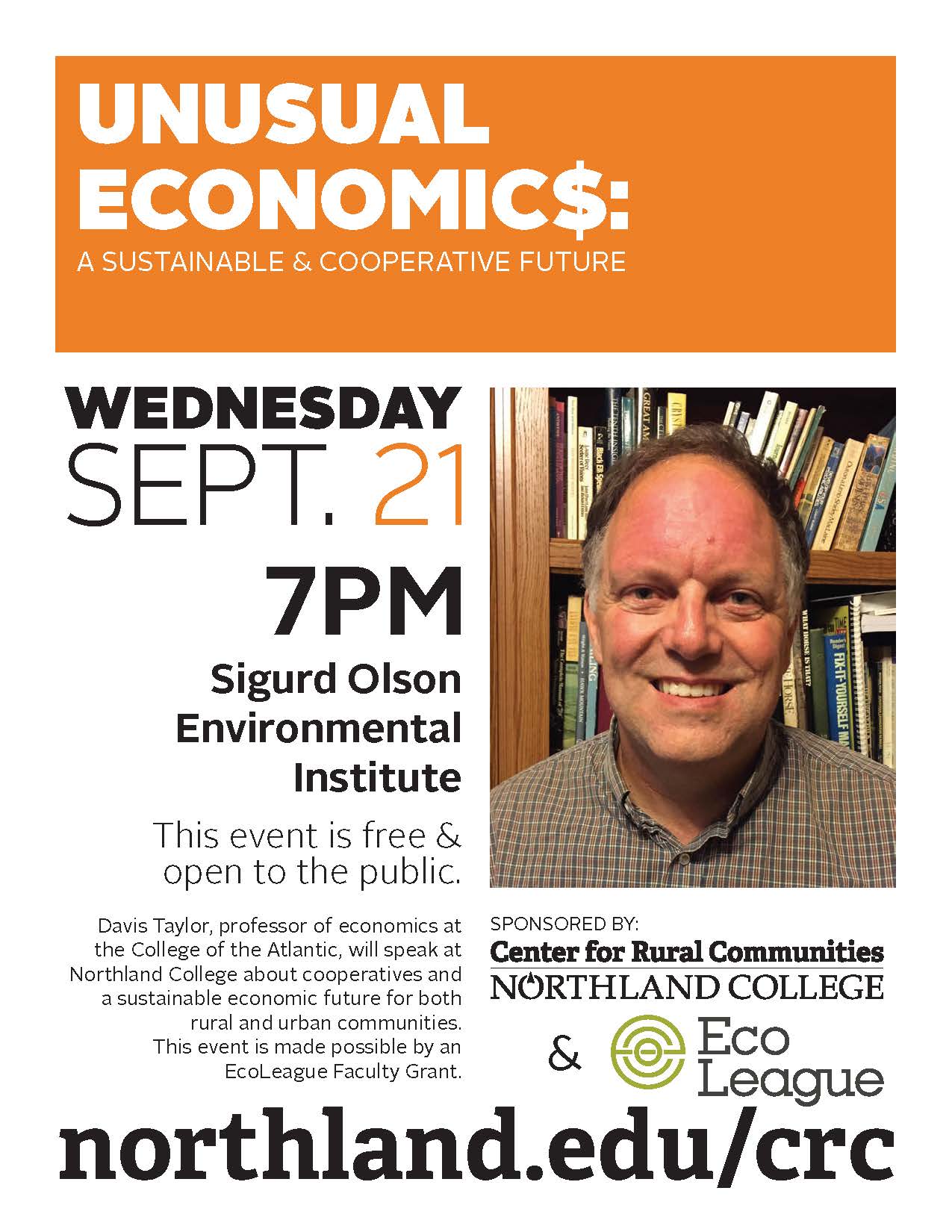
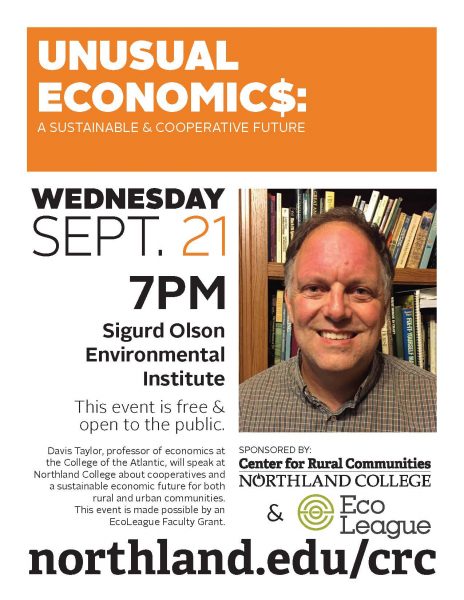 Unusual Economics: A Sustainable and Cooperative Future
Unusual Economics: A Sustainable and Cooperative Future
Davis Taylor, professor of economics at the College of the Atlantic, will speak at Northland College about cooperatives and a sustainable economic future for both rural and urban communities Wednesday, September 21 at 7 p.m. at the Sigurd Olson Environmental Institute.
This event is sponsored by the Northland College Center for Rural Communities and the EcoLeague, a consortium of six colleges and universities that share missions based on environmental responsibility and social change, including College of the Atlantic and Northland College. Davis’ visit is made possible by an EcoLeague Faculty Scholar Grant, which encourages faculty at member schools to collaborate with each other in areas of teaching and research across institutions.
Taylor pursues research in various forms of economics as well as sustainable community development. He has presented papers that expand upon the concepts of community and model the human ecology of forests. His current research efforts include the economics of food systems, the role of institutions in shaping economic development, and the ecological economics of resource collapse.
This event is free and open to the public.
Dog Mushing, Desert Canyons, and Singing Out: EcoLeague Students on the Move!
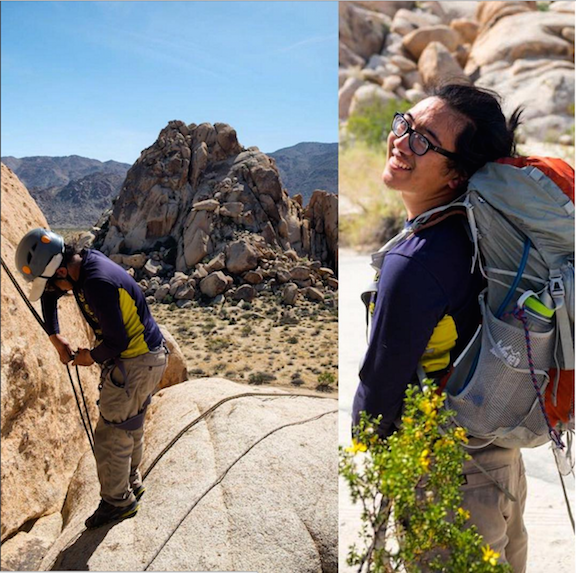
by Jasmyn DiMeglio, EcoLeague Writing Intern
“We  experienced a waking jolt from an earthquake with a 7.1 magnitude, saw a moose and her calf, attempted to ski down a forty-degree angled hill with heavy sleds tied to our packs, and had the pleasure of setting up a tent in forty mph winds,” says sophomore Audrey Roberts, about her tour in the Alaskan mountains near Hatcher Pass. “Our ten-day trip was quite eventful.”
experienced a waking jolt from an earthquake with a 7.1 magnitude, saw a moose and her calf, attempted to ski down a forty-degree angled hill with heavy sleds tied to our packs, and had the pleasure of setting up a tent in forty mph winds,” says sophomore Audrey Roberts, about her tour in the Alaskan mountains near Hatcher Pass. “Our ten-day trip was quite eventful.”
Whether packing for a dog sledding trip in blustery winds, preparing to rock climb in a desert, or registering a new Choir course, EcoLeague exchange students are also preparing for exciting surprises and diverse learning opportunities. Audrey, Andrew, and Melody are three of nine students participating in EcoLeague’s exchange program this Winter-Spring semester. Through this unique academic opportunity, students enrolled at any of the six EcoLeague member colleges have the option to move their studies to another campus for a semester or two during their undergraduate career. Located in disparate bioregions, such as the North woods of Wisconsin, the shores of the Atlantic in Maine, or the desert canyons of Arizona, each college offers a unique academic atmosphere in breathtakingly diverse landscapes. Despite the geographical differences, the small liberal arts colleges of the EcoLeague consortium are also very similar in their shared values of environmental thoughtfulness, sustainability, and social change.
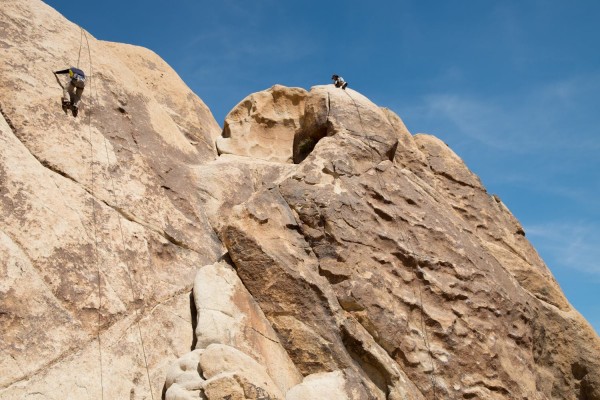
Andrew limbing a 5.10a face climb on Short Wall, Joshua Tree National Park
“One similarity that I’ve found is that both schools attract a certain kind of student, individuals who are incredibly passionate about what they do,” says Andrew Nguyen, a student from College of the Atlantic (COA) in Bar Harbor, ME, who is currently on exchange at Prescott College in Prescott, AZ. “They are the kind of people who go above and beyond to follow their dreams, and are driven by their own self-direction,” he says. A sophomore majoring in Human Ecology with concentrations in Sustainable Business and Outdoor Ed., Andrew also appreciates the common emphasis on “hands-on” learning at both schools, which he says aligns well with his personal learning style. Though Andrew describes both Prescott and COA to be incredibly similar, he has also noticed slight differences between the two rigorous academic programs.
“Prescott College is different from COA in the sense that it has different academic strengths. Whereas COA has an amazing Environmental Science program, Prescott has an incredible Adventure Education program,” he says. Like many EcoLeague students, Andrew appreciates this difference as it provides for a rich and “well-rounded” educational experience. Andrew is excited by the opportunity to focus on improving his Outdoor Education (OED) skills at Prescott. Currently, he is enrolled in OED courses such as “Outdoor Program Administration” and “Fear & Risk Through Rock Climbing,” both of which he enjoys.
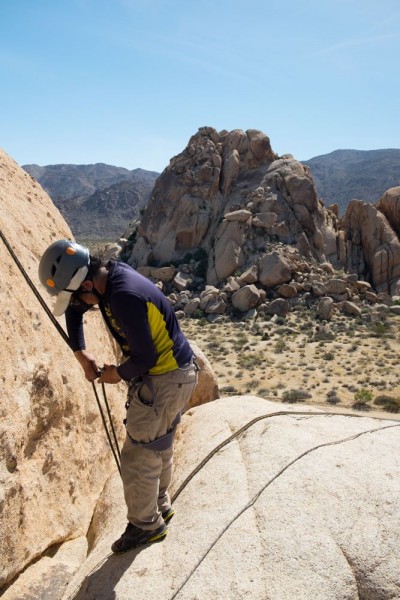
Rigging a double-strand rappel on top of Pixie Rock in Joshua Tree National Park.
“My time at Prescott College has been an excellent opportunity to become a better educator, to understand more thoroughly the administrative and operational processes of outdoor programs, and to become more adept at risk-management and decision-making,” says Nguyen. After college, Andrew hopes to combine his sustainable business skills, which he’s cultivated at COA, with his Adventure Education training and eventually manage an “Outdoor School.” Enthusiastic about his Adventure Ed. courses as well as the supportive Prescott College community, Andrew believes his EcoLeague exchange will enrich his academic development and will be useful in accomplishing his future goals.
Meanwhile, roughly 3,588 miles away, Audrey Roberts also is impressed and excited by the rigorous OED program at Alaska Pacific University (APU) in Anchorage, Alaska. “One of APU’s programs I have found to be pretty amazing is the Outdoor Studies program,” says Audrey. Intending to major in Natural Resources with an emphasis in Fisheries & Wildlife, Roberts has also recently considered incorporating Outdoor Education into her degree after spending a few months at APU. “I took a ‘Winter Wilderness’ course that included camping and touring in the mountains for ten days—learning about camping in the winter and navigating the avalanche terrain. It was quite the experience,” she says.
Another notable aspect of Audrey’s exchange has been the classroom environment at APU, which is very similar to that at her home school, Northland College in Ashland, WI. “Classes are small and interactive. Teachers and students have a close relationship and help is never far behind,” she says. Audrey also appreciates how easy it is to become involved in extra curricular activities. “Like Northland, you can always find something to join; alpine club, climbing group, photography, or even a paranormal club,” says Roberts. Overall, the tight-knit community at APU has been a highlight of Audrey’s EcoLeague experience. “Everyone knows everyone. You can always find a friend to go for a climb or a hike on the trails around Anchorage!” In addition to the familiar values of community-building, Audrey also enjoys the enriching academic opportunities available at APU.
“The classes I’m taking here are definitely helping me think about and explore my choices in studying Fisheries,” she says. “My ‘Applied Research’ course meets once a week to discuss current issues in Fisheries and climate change. We also get to talk with APU’s graduate students about their senior research project findings,” says Roberts. Aside from her Fisheries studies, Audrey has also enjoyed exploring new subjects, such as her “Dog Mushing” course. “Every Saturday we meet and assist in handling the dogs in the races. What I’m most excited for is getting to help handle the dogs for the Iditarod race.”
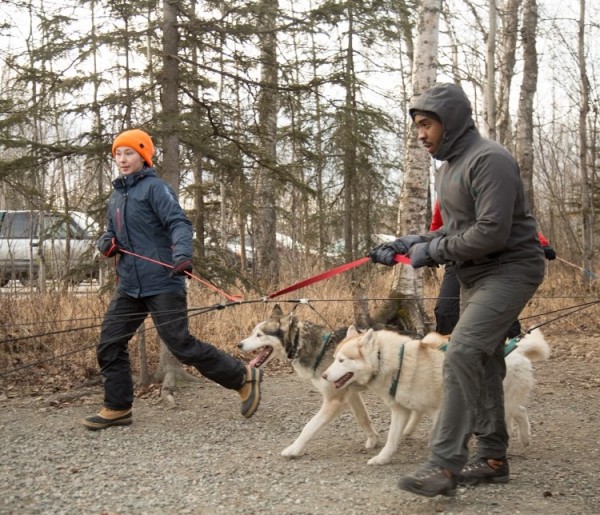
Audrey learning dog mushing skills at APU
Despite the discipline, Audrey believes her EcoLeague exchange courses have ultimately enhanced her academic growth. “I full-heartedly believe that EcoLeague is helping me take giant steps in my academic career. Not only do I get to study in a different and absolutely beautiful place, I get to experience the same thing I would back home, except with different eyes,” she says. “You can only learn so much in one place. Since being up here I’ve learned about so many different kinds of fish and birds—it’s seriously amazing seeing and getting to learn all of it in the flesh instead of in a book.”
Like Audrey, Melody Sarian also appreciates the freshness of a new environment during her EcoLeague exchange at Green Mountain College (GMC) in Poultney, VT. “I am so grateful to have had the opportunity to EcoLeague and to have learned so much about the ways in which I can bring ideas back to my home school,” says Sarian. “Seeing different schools which I have ties to provides me the insight needed to instill change and fresh ideas between them.” A junior majoring in Liberal Arts Studies with a concentration in Creative Writing, Melody values the creative atmosphere at GMC, which is “eco savvy,” with plenty of nice people who are always willing to lend a hand, much like at her home school, APU. A returning EcoLeague student, Melody also believes the program has helped enrich her academic development on the path to her degree. “I have gained so much knowledge here that I’m almost certain I couldn’t get anywhere else,” she says.
Melody is particularly enthused by the REED program offered through GMC’s academics. “REED is an amazing Ecological Architecture program which I have really taken a liking to!” A unique major and academic department at GMC that combines both Architecture and Sustainability Studies, REED stands for “Renewable Energy & Ecological Design,” offering courses such as “The Ecological Design Studio”, “Revolutionary Europe”, and “Seminar to Interdisciplinary Approaches to Literature,” all of which Melody has really enjoyed.
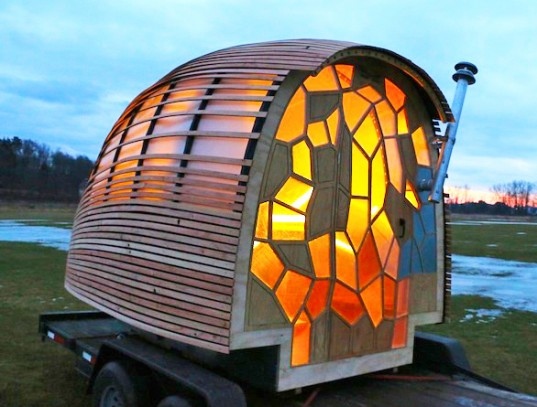
REED Program Tiny House Design
“I especially love the Arts and History classes I have taken here. The Arts program is so diverse and expansive towards individualistic, hands-on learning and I love it,” she says. Another course offered at GMC that Melody appreciates is Choir. “Choir has been one of the best things I’ve been a part of on the GMC campus because I love singing!” With a wide array of creative and intellectually stimulating course offerings, Melody’s EcoLeague exchange at GMC has been beneficial in regards to her future plans. “I’ve learned so much and want to apply this to any careers and artistic endeavors I will peruse in the future.”
Despite differences in geographic location and academic emphases, each EcoLeague school offers a unique and rigorous learning environment that values environmental awareness, creativity, community-building, and hands-on learning experiences. Regardless of the major, the exchange program serves to aid academic and personal growth in preparation for fruitful future and professional experiences. Whether trekking through Alaskan mountains, climbing rocky terrains, or studying art in the Vermont countryside, the EcoLeague exchange program provides students with expansive and exciting opportunities.
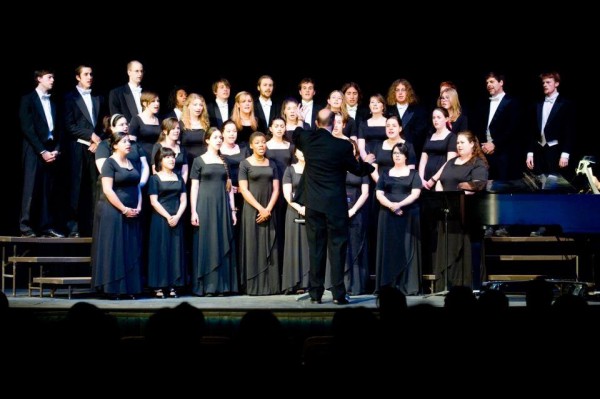
GMC Choir’s “Jazz Ensemble” Performance
River Canyons and Open Waters: Outdoor Education with EcoLeague
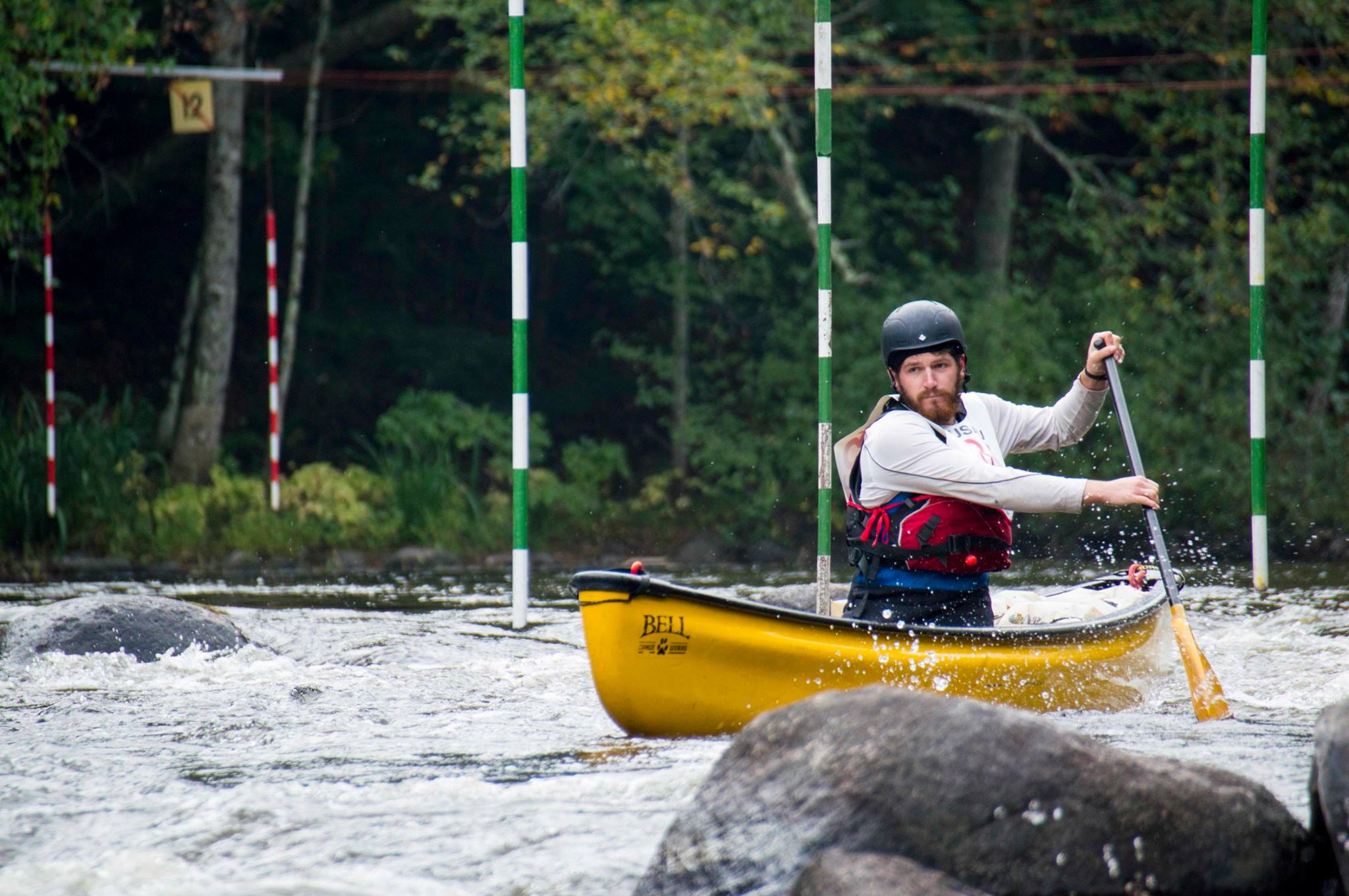
by Jasmyn DiMeglio, EcoLeague Writing Intern
Why pursue a degree in Outdoor Education? Perhaps you have a hearty appetite for travel, perhaps you’re eager to pair wilderness skills with values of equality and justice, or maybe you’re simply interested in fostering personal growth through adventure experiences with at-risk youth. For Dashiell Potter, a junior and EcoLeague exchange student, motivation stems from all of the above.
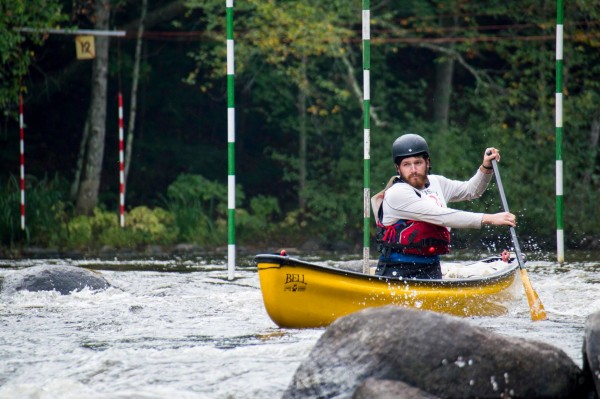
Dashiell Potter competing in a slalom race on the Wolf River as part of the Professional Development Semester.
Exercising experiential education practices, the field of Outdoor Ed. (OED) promotes both interpersonal and intrapersonal growth and aims to connect participants to the natural world. Although based in immensely different nature environments, both Northland and Prescott Colleges’ OED programs share similar core values, philosophies, and theories, which are deeply embedded in their curriculums. Located in the North woods of Ashland, WI, Northland College’s program is shaped by the breathtaking presence of Great Lake Superior as well as by the natural history and community of the region. On the other hand, nearly 1,900 miles away in Prescott, AZ, Prescott College’s program prioritizes field opportunities within the elevated desert landscape.
“Both places give a lot of opportunity for exploration”, says Dashiell Potter. Each offering a unique and wholesome approach to Outdoor Education, both EcoLeague schools serve as great foundations for students hoping to pursue their careers in the outdoors, much like Dashiell, a Northland student who participated in the EcoLeague exchange program and spent an exciting semester at Prescott.
Potter’s interest in wilderness exploration and outdoor travel started at the young age of twelve. Growing up, Dash enjoyed attending a wilderness adventure camp in Northern Minnesota but it wasn’t until after a spending a “gap” year in Patagonia through the National Outdoor Leadership School (NOLS) program, when his passion really “clicked” and he knew he wanted to pursue a degree and eventually a career in the field of Outdoor Education.
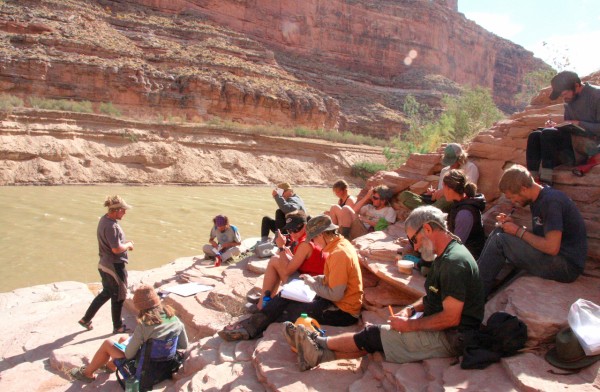
Prescott College’s field-based Wilderness Exploration Landscape course
“Outdoor Ed. is important because it gives people the opportunity to learn and grow in a different environment, other than a classroom,” says Potter. “It’s also based in experiential education, which is hands on learning– you’re learning by doing.” Learning about the importance of experiential education in the two very different regions of WI and AZ was extremely beneficial for Potter’s academic development on the path to his degree. “They both have great place-based learning aspects to their curriculum. It was great to experience a different place and program because I was able to take what I learned in the desert back home to the North woods with me,” he says.
OED also provides students with the opportunity for extensive travel. One of Dashiell’s favorite courses at Northland was “Wilderness Instructor Training”. Designed as a month long intensive field course in Arkansas, Dash learned about technical skills of whitewater paddling while simultaneously refining teaching and wilderness leadership skills. Although he took this course during his freshman year, it is still one of the most memorable for him. “This was an incredible trip where I learned about being a leader, living in the wilderness and working efficiently as a group.
Like Northland, Prescott also offers highly integrated courses which was a highlight for Dash. “These courses blend outdoor education with other disciplines, between content and experience or the tactile and the cognitive,” says David Lovejoy, an Adventure Education professor at Prescott College. Some of the integrated courses available include Bike Packing, Winter Ecology, Rock Climbing and Yoga, Environmental Issues, and Backcountry Skiing.
“Students need to experience the wild and form direct emotional relationships with the natural world. This fosters an appreciation for our place within nature and an understanding of our dependence,” says Lovejoy. A unique element of Prescott’s program that is conducive to forming these nature relationships is their block semester. During the block semester, OED majors have the opportunity for extended travel and field expeditions, as they participate in a single intensive course. This structure enables students to spend a one-month period away from campus to explore and cultivate skills in remote settings.
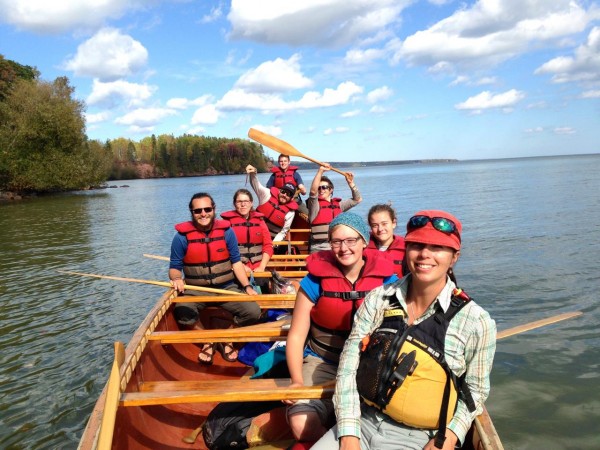
Professor Elizabeth Andre, Dash, and fellow “Fall Block” OED students paddling on Lake Superior in the 36′ Montreal canoe
Back in Ashland, WI, OED students also participate in a series of similarly intensive “block” courses during the fall semester of their junior year at Northland, which Dashiell has recently completed.
“Everyday is something new; we do a variety of things—we cover teaching skills, go to conferences, learn how to identify trees, how to build a debris shelter, or start a fire with a bow drill,” says Potter. Commonly referred to as “Fall Block”, the four-course professional development program combines land travel, water travel, woodland and craft skills (or primitive living skills) and aims to develop students as effective educators.
Another unique aspect to Northland’s OED program is its flexibility, as students are able to select one of three different emphases: Wilderness Leadership, Therapeutic and Universal Design, and Natural History. This way, students are able to focus on cultivating detailed skills useful for specific types of professions they’re interested in pursuing. Nonetheless, Northland’s core values and philosophies are reflected in all three areas of study.
“Our program has a strong foundation in social justice, equity, and inclusion of all people. We also have a foundation in environmental stewardship and sensitivity,” says Northland professor Elizabeth Andre. Through its close analysis of current challenges, practical experience and skill development, as well as future potential for the profession, Northland’s OED curriculum is geared toward promoting a critical awareness amongst their students.
“We believe that outdoor education is a tool for creating the world in which we want to live—through connecting people to the outdoors we help them discover the importance of community both ecological and social,” Andre says. Such philosophies are not only important to the success of their students, but they are also very similar to those at the heart of Prescott’s OED program.
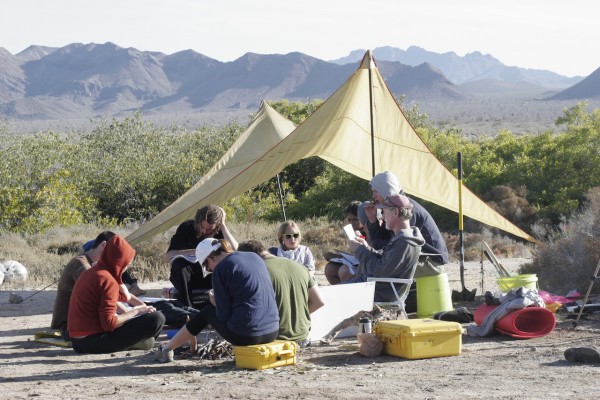
One of Prescott’s Outdoor Classrooms
“Our core values are connecting people with nature and each other in meaningful ways,” says professor Lovejoy. “We value the ability of adventure education to foster self-examination and illuminate issues of fairness and equality.” As these principles are embedded in Prescott’s curriculum, many graduates have reflected favorably upon the attributes gained here. “They have highlighted a passion for working with groups toward a common goal, as well as good communication skills and collaborative abilities,” he says.
As a soon to be graduate, Dashiell Potter is incredibly grateful to have had the opportunity to learn from both professor Andre and professor Lovejoy through his EcoLeague exchange program.
“After I graduate I’d like to work in wilderness therapy or with at-risk youth programs,” he says. “I want to take those people out into the wilderness who don’t have the opportunity to go.” Other professions Northland and Prescott graduates pursue include wilderness guides, outdoor skills instructor, outdoor business owners, program administrators, and environmental educators.
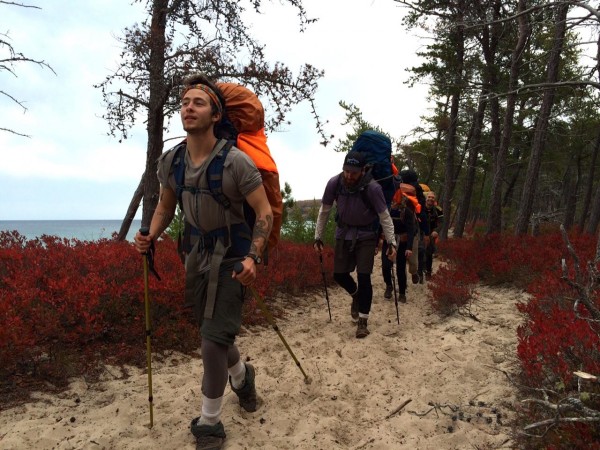
Northland’s Professional Development semester, Dash and other OED students backpacked for six days along the North Country Trail
Regardless of the profession, OED promotes important social and ecological awareness as well as personal growth through intimate connections with the natural world. These EcoLeague schools provide students with extraordinary resources, faculty support, and a riveting landscapes for developing the skills they’ll need to navigate the both outdoor and professional world. “The two areas are pretty incomparable, I have felt wonder paddling the waters of both the North and South. Learning from different professors, experiencing different teaching styles and seeing how they approach adventure education was great to experience,” says Dash.
“Farm Nimbly”: Food Sustainability at EcoLeague Schools APU and GMC
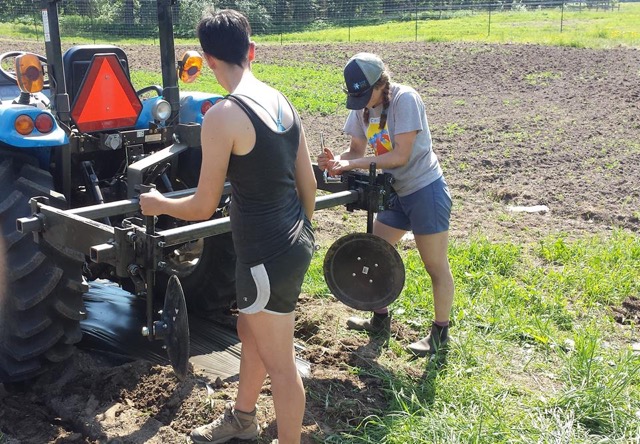
by Jasmyn DiMeglio, EcoLeague Writing Intern
“Growing food in the subarctic is not for the faint of heart,” says Megan Talley, manager of Spring Creek Farm in Palmer, Alaska. With cold, blustery winds and short growing seasons, sustaining a sturdy local food system in this region can be quite challenging.
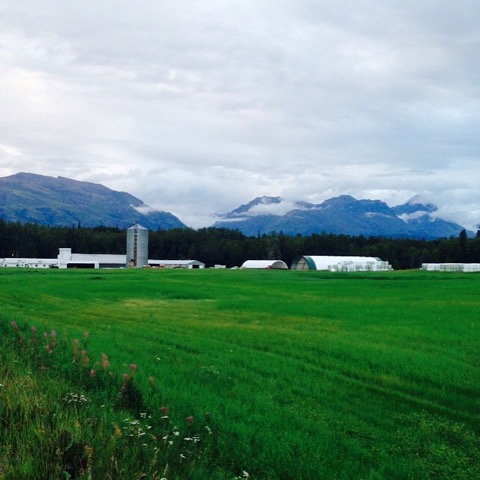
Spring Creek Farm in Palmer, Alaska
However, despite climatic obstacles, Alaska Pacific University’s Spring Creek Farm takes a progressive approach to providing surrounding communities with access to healthy, fresh, and locally grown food. A key part of this approach includes preparing the next generation of food justice activists with important skills and critical lenses to examine both economy and environment while farming in a rapidly changing world.
Meanwhile roughly 4,500 miles away, Cerridwen Farm integrates hands-on learning opportunities with Green Mountain College’s liberal arts education in Poultney, Vermont. Both projects of EcoLeague schools, Spring Creek and Cerridwen Farms are two comprehensive programs that offer ample opportunity for student action, community collaboration, and education in sustainable agriculture. Although located on opposite ends of the continent, the two farms share similar values and philosophies which include environmentally thoughtful growing methods, community building, and a focus on food justice.
As the two farms are located in extremely different bioregions, one might assume that their growing processes would differ as well. However, both GMC and APU’s programs face similar challenges of erratic climate conditions during their growing seasons.
“This part of the Earth is at the forefront of climate change. Unpredictable weather patterns, destructive climate events and soil erosion compound the threat to a secure local food system,” says Talley. Farmers in the Alaskan region also struggle with cold soil temperatures, plant “bolting” from the long hours of daylight, and very dry springs. Such conditions make it crucial that new growers are provided with the tools they need to “farm nimbly” and resist crop loss, which is something Spring Creek Farm strives toward year-round. Though these threats can be discouraging for any farmer, APU’s project and crops continue to thrive and Talley remains optimistic. “The low soil temperatures translate to the sweetest carrots anywhere,” she says.
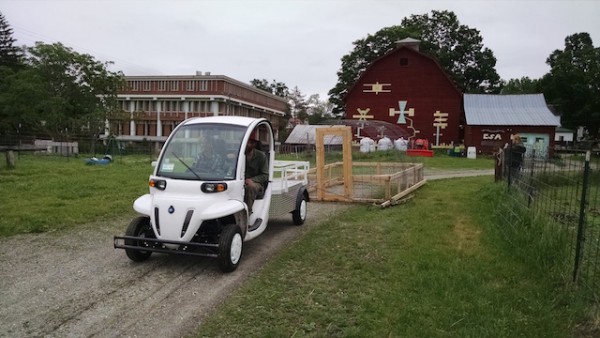
Day at Cerridwen Farm, GMC
“Farming nimbly” is a phrase that Vermont farmers can also appreciate as they grapple with complications of their own, some similar, some unique to their bioregion.
“In the last two years we have worked through a devastating hail storm, incredibly high winds, a record early freeze, and record low winter temperatures,” says Bay Hammond, the farm manager at Green Mountain College’s Cerridwen Farm. Due to these unpredictable weather patterns, GMC growers have become more dependent on their three-season houses. In addition to the outdoor Hillside Garden, the farm also has two High Tunnels and a hoop house for growing heirloom tomatoes, cucumbers, ginger, eggplants, and peppers year round. Though maintaining crops in erratic conditions can be difficult, Hammond believes each hardship becomes an opportunity for learning. These opportunities are always utilized by students involved at the farm. “The students are bright, entrepreneurial, and hard workers. They are dedicated to the farm and always step up to meet the challenges,” Hammond states.
GMC’s Farm and Food Program offers multiple avenues for student involvement at Cerridwen Farm. Some of these options include 1-3 credit skill intensive courses, work-study employment, or joining Farm Crew.
As Eleanor Tison, director of the Food Systems Program explains, “Farm Crew is an all-volunteer student organization overseen by the farm manager. Students in Farm Crew meet weekly, receive weekly email updates, and participate in running the farm.” This organization is a great way for students to apply the skills they learn in the classroom, as it offers many possibilities for engagement. Members of Farm Crew sign up for animal and vegetable chore slots, help with decision making, and become involved with special events, such as the GMC farmers’ market or the October Welsh Harvest Festival, which is an annual event open to the larger community of Poultney.
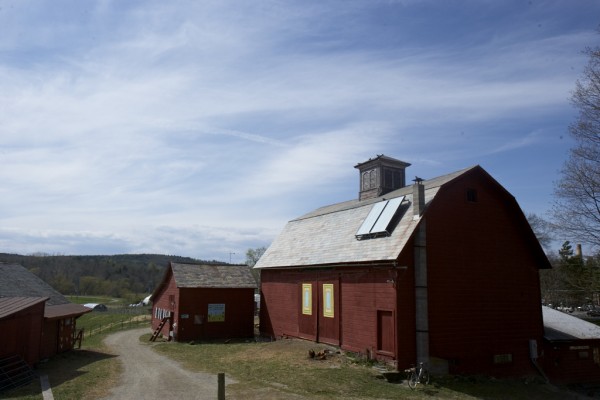
Cerridwen Barn at GMC
Special events are not the only opportunities for community engagement; Cerridwen Farm is always open and accessible to all interested visitors. “As our farm is adjacent to residential neighborhoods in the town of Poultney, we have daily visitors who visit the chickens, pigs, cattle, goats, sheep, and ducks on our farm,” says Tison. GMC also operates a self-serve “farm store” which is open 24/7 for customers looking to purchase eggs, seasonal produce, and frozen meat products.
These EcoLeague Farms are major resources for community collaboration and creative thinking in both Poultney and in Anchorage, AL.
“Community building is the basis for cultivating the Alaskan food movement. We strive to be a hub for sharing meals and ideas which will usher in a more robust and resilient local food system,” says Talley. APU’s program regularly hosts community volunteer opportunities and workshops, which are open to all, students and non-students alike. These workshops encompass many exciting topics such as native plants and permaculture design. Like the Cerridwen Farm, Spring Creek also operates a small-scale Community Supported Agriculture Share (CSA) and has a booth at the community farmers market in Anchorage. Talley describes the downtown market as a “vibrant community staple and social event” that brings folks together on a weekly basis.
The CSA program and farmers market are only two of four destinations for the produce grown through the program. Another place where Spring Creek Farm’s vegetables are used is on campus in the cafeteria. As much food as possible is distributed to dining services, but the farm also donates a portion of their bounty to low income-families through their “Alaska Tilth” program. In a fight to end hunger, Alaska Tilth was founded in collaboration with the University of Alaska’s Experiment Farm and the cooperative extension of the Supplemental Nutritional Assistance Program (SNAP).
“The fresh food our farm donates is brought to food pantries each week by a SNAP educator who demonstrates seasonal cooking with fresh ingredients, sharing a meal with those in need,” says Talley. Only within its first year of operation, Alaska Tilth has been a huge success and has plans for expansion in 2017.
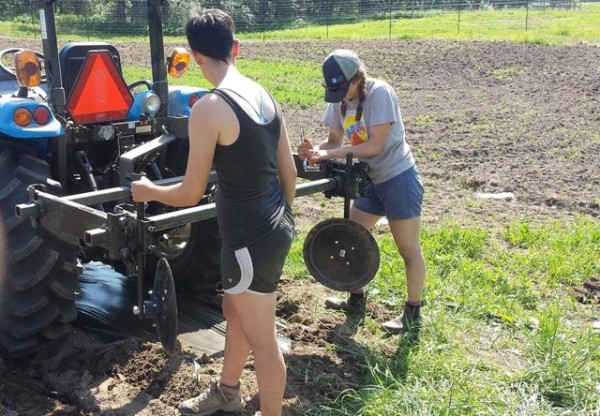
Fixing the Tractor, Spring Creek Farm
Both Spring Creek and Cerridwen Farms work as springboards for larger visions of the future. Exemplifying strong commitment to their communities, to the futures of their students, as well as to the land, these EcoLeague programs are able to thrive year round, despite climatic hardships. Offering multiple opportunities for involvement, an abundance of locally grown food, and important skills for future generations, the programs set great examples for farmers nationwide.

